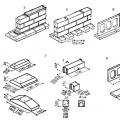The first group of students completed the new corporate program. The results have been summed up and feedback has been received that will help make training course better. By the end of the year, about 150 mid-level managers will undergo training at MSUU of the Moscow Government. These are heads of substations, senior paramedics and the personnel reserve of the Ambulance and Emergency Station medical care named after A.S. Puchkov.
A month of training - how it was
Encouraged and inspired. After a month of intensive training, they are not at all tired, but, on the contrary, with sparkling eyes, an excellent attitude and a thirst for knowledge. The first 18 students at the last lesson shared their impressions.
“I am grateful to all the trainers for teaching us to think and reason differently,” says the head of the station’s operations department Alexander Bayutin. “We felt like a team of like-minded people who should see common goals and achieve them together.”
“Thank you for moving forward,” said the deputy chief physician of the regional association Vladimir Filimonov. – I realized that I need to tune in to accomplishing tasks through managing myself and my emotions. I took the time to work on strategy by clearly planning my activities.”

The training course was very rich and consisted of 8 thematic blocks. The material was given in the format of seminars, master classes, and trainings. Among them are “Employee Management”, “Personal Effectiveness of a Manager”, “Customer Focus in a Medical Organization”, “Legal Conflictology”, “Confident Behavior in conflict situations", "Effective meetings", "Non-financial motivation", "Influence and effective interaction in the workspace."
Substation managers shared what they learned that was useful, what topics should be added and strengthened in the program, and what knowledge they already apply in their management practice.

Andrey Trofimov, chief paramedic of the Ambulance and Emergency Medical Care Station named after. A. S. Puchkova: “I really liked the master class by Stanislav Yunis “Confident behavior in conflict situations.” He showed an interesting technique for getting out of a negative situation. It is necessary to “cool” a person with a logical question, lead him away from emotions into logic and switch him to a different mood. I have already used this technique in my work, in a conversation with my employee. Happened".
Maxim Litvin, head of substation No. 13: “It was very useful to learn about planning using the Esenhower matrix. This is one of the time management methods for determining the priority tasks of the day. Now I make time for this. It’s easier to plan now, I have time to do more.”
Alexander Shevchuk, head of substation No. 15: “I especially remember the topics on team building, employee motivation and customer focus. I think that testing should be used when hiring to determine the professional qualities required in the work of an ambulance. There are different situations on calls. And being able to communicate correctly and competently resolve a conflict is a very important skill.”

Peter Davydov, manager of substation No. 17: “I am already practicing active listening. This helps in communication with employees. I defined strategic goals for myself and began to work for the future. I would like to know more about the legal protection of our employees. We don’t know this topic; situations in our work are different, including when communicating with patients.”
Vladimir Vlasov, head of substation No. 7: “It was useful for me to learn about personality psychotypes. There are four of them: analyst, organizer, psychologist, creative. If you learn to identify them, it will be easier to speak the same language with a person and understand what motivators should be used when working with him. I really liked the topics “Confident behavior in conflict situations” and “Non-material motivation”. In communicating with an employee who wanted to quit, the knowledge gained helped. In the end, she didn’t leave and stayed working with a positive attitude. It was useful to learn how to handle complaints. Recently, in my practice, there was a complaint from a resident. We talked, discussed issues, settled all the problems.”
Maxim Grankov, head of substation No. 51: “I would suggest separating the topics “Delegation” and “Nonverbal Communication” into a separate block. This is very important and helpful information. I would like to know more about this. Disclose legal aspects to tell employees and apply in their practice.”
Dmitry Tarasov, manager of substation No. 6: “Use more videos and films. For example, during a training session on customer focus, we were shown a very “catchy” film. It told stories of patients, about how important it is to humanly enter into their situation and help. I even showed this film to my employees. The effect was strong. Such educational materials help us understand what we are working for.”
Artem Dyakov, head of substation No. 36: “In my work I already use the tools given to us. For example, there was a complaint from a woman. She came with a negative attitude. I listened and showed understanding. He said that we are interested in improving the quality of medical care, your opinion and feedback are important to us. She calmed down. This really works. In my head I was in the mood to solve the problem, not to conflict. “I was able to reorient myself and concentrate on solving the problem rather than on negative emotions and self-defense.”

About the program and cooperation with the A.S. Puchkov Ambulance and Emergency Medical Care Station
Head of the Department of Personnel Development Projects at Moscow State University of Education and Science, Moscow Government Elena Evtikhevich tells what is unique educational program, designed specifically for the needs of the customer.
— The training course consists of three modules: “Employee management and personal effectiveness of a manager”, “Business communications”, “Customer focus”. Why did you focus on these topics?
— Before starting to develop the program, we studied the needs and wishes of future students. We went to substations: attended meetings, interviewed managers, studied their working hours. We have identified the main problems, and therefore areas for their further development. For example, they need to understand the importance of systematic team management, learn constructive behavior in conflict situations, hold effective meetings, master techniques for working with stress, and obtain practical templates and algorithms for working with clients, resolving complaints and claims.
— What do you remember about the first group of listeners?
— Listeners have very high motivation. They are open and understand that they need to change, understand mistakes and move forward. The participants had a strong team spirit. This speaks of a professional brotherhood, which, first of all, is very connected with their mission - saving people. They clearly see the results of their work. They know about the performance indicators (KPIs) adopted in the medical organization (this is, for example, the speed of arrival at the place, the time of stay at the exit, the correct execution of documents). In addition, they are excellent at analyzing, they immediately want to put the received management tools into practice and understand whether it works or not.
— What was the first thing you managed to convey to the audience?
— Awareness of the role of a manager as a person who manages, correctly organizes the work process, and motivates employees. He doesn't try to do everything with his own hands. A leader is authority and influence. His task is to focus on the best result. We were able to explain to the program participants that strategic management is important in their work: building a cohesive team, developing a culture of meetings and internal communications. The manager’s task is not only to move everyone towards the result, but also to ensure the functioning of the “coupling” mechanism. Everyone must understand that they work together, each link in the team is important. And this is the psychology of management, which every manager should know about.
— What interesting teaching approaches were used?
— In order to better remember and assimilate the material, the format of the classes included seminars, master classes, and trainings. For example, to explore the topic of delegation of authority, a simulation was used board game. We held an “effective meeting” in the workshop format. This was a group activity where participants learned through their own active participation in team interaction. The share of the theoretical part here is insignificant and gives way to direct “practice”. Discussions during the workshop are very dynamic. Our participants really liked this format. Discussions on the questions “Why is the meeting not effective?”, “What needs to be done for the meeting to be effective?” were very stormy. Our listeners spent brainstorm and developed their own standards for conducting meetings. This is a very useful independent work.
— Having received feedback from the first participants of the program, what did you decide to add to the training course?
— For example, we will add a topic on developing feedback with subordinates. We will strengthen the unit on identifying personality types and an individual approach to working with employees. It is important for a manager to know this, since knowing a person’s personality type allows them to determine a person’s motivation, his needs, how he perceives and processes information - all this helps to better understand his employees. In addition, there will be more activities and exercises to develop communication skills.

Completing the first program
“Practice has shown that there is a need to increase personal efficiency,” said the station’s chief physician Nikolay Plavunov. – I am grateful to the team of MSUU of the Moscow Government for developing this program for us in record time. At the beginning of the year, we discussed the possibility of cooperation, and training began in March. And it turned out to be a really interesting and practical cycle. I am grateful to my colleagues for their desire to develop, their desire to be effective leaders and their responsible approach to learning.”
“I am glad that our cooperation took place,” said the acting rector of MSUU of the Moscow Government Vasily Fiveysky. – The management of the emergency medical service station sets its own management standards. He does this purposefully, with the prospect of moving his organization’s corporate culture to a new level. Today in Moscow, many industries are interested in systematic training of managers. The healthcare sector is ahead of everyone, and your team confirms this. Many people are guided by you and turn to us with a request to prepare a corporate program. And it is right. After all, paying special attention to management training of managers is a general global trend.”
“By training substation managers, we develop unified system training managers for your medical institution,” comments the director of the Center for Healthcare Development of Moscow State University of Medicine of the Moscow Government. Konstantin Tsaranov. – The desire to improve the effectiveness of managers confirms that you are already a strong team. You understand what you are missing and what you need to do to successfully move forward. For our part, we will expand the area related to management psychology. Doctors have a wealth of medical knowledge, but they tell us very little about the psychological components in the work of a leader. Therefore, we will talk more about personality types, the development of internal communications, and personal effectiveness.”
The second group of managers of the substations of Ambulance and Emergency Medical Care named after A. S. Puchkov begins training on April 9.
Reference:
MSUU of the Moscow Government is implementing several areas in training employees of medical institutions. In the educational line, including a course for teaching the basics of working in the EMIAS system. Also in 2014, the University launched a unique two-year leadership training program.
I approve
[position, signature, full name.
Manager or other
Official authorized
Approve
[organizational and legal form, job description]
name of organization, [day, month, year]
enterprises] M.P.
Head of the Operations Department of the Emergency Medical Service Station
[name of organization, enterprise, etc.]
This job description has been developed and approved in accordance with the provisions of the Labor Code Russian Federation and other legal acts regulating labor relations.
1. General Provisions
1.1. The head of the operational department of an ambulance station belongs to the category of managers and is directly subordinate to [name of the position of the immediate supervisor].
1.2. A person who has a higher professional education in the specialty “General Medicine”, “Pediatrics”, an internship and/or residency in the specialty “Emergency Medical Care”, or professional retraining in the specialty “Emergency Medical Care” is accepted for the position of head of the operational department of an emergency medical service station. "if you have a postgraduate degree vocational education in one of the specialties: “Anesthesiology-Reanimatology”, “General Medical Practice (Family Medicine)”, “Therapy”, “Pediatrics”, “Surgery”, a specialist certificate in the specialty “Emergency Medical Care” and no work experience in the field of professional activity less than [meaning] years.
1.3. The head of the operational department of an ambulance station must know:
Laws of the Russian Federation and others regulations regulating the activities of healthcare institutions;
Laws and other regulatory legal acts of the Russian Federation in the field of healthcare, protection of consumer rights, ensuring the sanitary and epidemiological well-being of the population;
Principles of labor organization;
Basics of organizing emergency medical care for adults and children;
Organization of the provision and features of the work of the emergency medical service during emergency situations;
Basics of interaction with civil defense services, disaster medicine and the Ministry of Emergency Situations of Russia;
Indications for calling specialized emergency medical teams;
Fundamentals of planning, economic and financial activities of a medical organization;
Medical ethics;
Psychology of professional communication;
Fundamentals of labor legislation;
Internal labor regulations;
Labor protection and fire safety regulations.
2. Job responsibilities
Head of the Operations Department of the Ambulance Station:
2.1. Manages the activities of the department in accordance with the position, functions and objectives of the department.
2.2. Improves forms and methods of work, planning and forecasting of department activities, placement of personnel in workplaces and their use in accordance with qualifications, formation of a regulatory and methodological framework.
2.3. Coordinates the activities of the department with other structural divisions of the ambulance station, ensures their interaction in work.
2.4. Monitors the work of paramedics in receiving calls and transmitting special messages.
2.5. Monitors the density of incoming calls and regulates their flow depending on the urgency or reason for the call.
2.6. Monitors the compliance of the brigade profile with the complexity of the call.
2.7. Monitors the efficiency of the work of field teams (time to go to a call, arrive to a call and complete a call).
2.8. Monitors the timely delivery of patients, women in labor, and injured patients to the emergency departments of the relevant hospitals.
2.9. Coordinates the provision of information to the public about sick and injured people.
2.10. Monitors the maintenance of the emergency medical service call database.
2.11. Monitors and records the work of ambulance vehicles.
2.12. Provides interaction with local authorities, the Department of Internal Affairs, fire departments and other operational services.
2.13. Takes measures to ensure that department employees fulfill their job responsibilities and internal labor regulations.
2.14. Develops long-term and current work plans for the department and monitors the implementation of these plans.
2.15. Analyzes the work of the department for the reporting period, submits a report on the work of the department in the prescribed manner.
2.16. Monitors the quality of medical documentation.
2.17. Organizes the receipt by employees of the department of additional professional education (advanced training, professional retraining) in accordance with the legislation of the Russian Federation.
2.18. Systematically improves his professional qualifications.
2.19. [Other job responsibilities].
3. Rights
The head of the operational department of an ambulance station has the right to:
3.1. For all social guarantees provided for by law.
3.2. Make proposals to senior management to improve the work of the station's operational department.
3.3. Make decisions independently within your competence and organize their implementation by department employees.
3.4. Require the management of the organization to provide assistance in the performance of their professional duties and the exercise of rights.
3.5. Sign and endorse documents within your competence.
3.6. Interact with heads of departments, obtain information and documents necessary to perform their job duties.
3.7. Monitor the work of subordinate employees, give them orders within the framework of their official duties and demand their strict execution, make proposals to the management of the institution for their encouragement or imposition of penalties.
Job description of the head of the emergency medical care department[name of organization, enterprise, etc.]
This job description has been developed and approved in accordance with the provisions of Order No. 541n of the Ministry of Health and Social Development of the Russian Federation dated July 23, 2010 “On approval of the Unified Qualification Directory of positions for managers, specialists and employees, section “Qualification characteristics of positions of workers in the field of healthcare”, and other legal acts regulating labor relations.
1. General Provisions
1.1. The head of the emergency medical care department belongs to the category of managers and is directly subordinate to [name of the manager's position].
1.2. The head of the emergency medical care department is appointed to the position and dismissed from it by order of [name of position].
1.3. A person with higher professional (medical) education, postgraduate professional education and (or) additional professional education and a specialist certificate in the specialty in accordance with the Qualification requirements for specialists with higher and postgraduate medical and pharmaceutical education in the field of health care, approved in accordance with the established procedure, work experience in the specialty of at least 5 years.
1.4. During the absence of the head of the emergency medical care department, his official duties are performed by [position].
1.5. The head of the emergency department must know:
Constitution of the Russian Federation;
Laws and other regulatory legal acts of the Russian Federation in the field of healthcare, consumer protection and sanitary and epidemiological welfare of the population;
Regulatory legal acts regulating the circulation of potent, psychotropic and narcotic drugs;
Regulatory and methodological documents in the area of professional activity;
Principles of labor organization;
Fundamentals of planning, economic and financial activities of a medical organization;
The procedure for executing business and labor contracts;
Forms and methods of organizing hygienic education and upbringing of the population;
The procedure for maintaining primary accounting and reporting documentation;
Medical ethics;
Psychology of professional communication;
Fundamentals of labor legislation of the Russian Federation;
Internal labor regulations;
Norms and rules of labor protection, safety, industrial sanitation and fire safety.
2. Job responsibilities
The head of the emergency medical care department is assigned the following job responsibilities:
2.1. Management of the activities of the emergency medical care department in accordance with the regulations on the structural unit, its functions and tasks.
2.2. Improving the forms and methods of work, planning and forecasting the activities of the department, placing personnel in workplaces and their use in accordance with qualifications, forming a regulatory and methodological base, a base of material and technical means for laboratory and instrumental diagnostics.
2.3. Coordinating the activities of the department with other structural divisions of the medical organization, ensuring their interaction in their work.
2.4. Monitoring the work of department staff, the quality of treatment, compliance with the standards of medical care when medical personnel perform a list of works and services for diagnosing the disease, assessing the patient’s condition and the clinical situation, for treating the disease, the patient’s condition, the clinical situation in accordance with the standard of medical care .
2.5. Ensuring compliance with labor laws and labor protection in the department.
2.6. Taking measures to ensure that department employees fulfill their job responsibilities and internal labor regulations, standardization requirements and metrological support for research, measurements, and tests.
2.7. Development of long-term and current work plans for the department, monitoring the implementation of these plans.
2.8. Analysis of the work of the department for the reporting period, submission of a report on the work of the department in the prescribed manner.
2.9. Monitoring the quality of medical documentation.
2.10. Organization of additional professional education (advanced training, professional retraining) for employees of the department in accordance with the legislation of the Russian Federation.
2.11. Systematic professional development.
2.12. [Other job responsibilities].
3. Rights
The head of the emergency medical care department has the right:
3.1. For all social guarantees provided for by the legislation of the Russian Federation.
3.2. Submit proposals to improve your work and the work of the medical organization for consideration by senior management.
3.3. Make decisions independently within your competence and organize their implementation.
3.4. Demand that the management of a medical organization provide assistance in the performance of their professional duties and the exercise of rights.
3.5. Sign and endorse documents within your competence.
3.6. Receive information and documents necessary to perform your job duties.
3.7. Check the correctness and completeness of the nursing staff's implementation of the attending physicians' prescriptions.
3.8. [Other rights provided for by the labor legislation of the Russian Federation].
4. Responsibility
The head of the emergency medical care department is responsible for:
4.1. For non-fulfillment or improper fulfillment of the duties provided for in these instructions - within the limits determined by the labor legislation of the Russian Federation.
4.2. For offenses committed in the course of carrying out their activities - within the limits determined by the current administrative, criminal and civil legislation of the Russian Federation.
4.3. For causing material damage to the employer - within the limits determined by the current labor and civil legislation of the Russian Federation.
The job description has been developed in accordance with [name, number and date of document].
Head of HR department
[initials, surname]
[signature]
[day month Year]
Agreed:
[initials, surname]
[signature]
[day month Year]
I have read the instructions:
[initials, surname]
[signature]
[day month Year]




